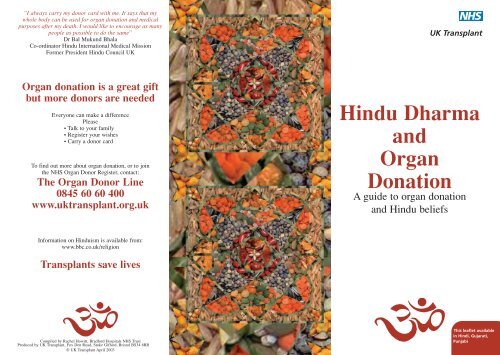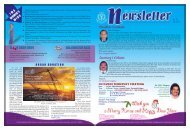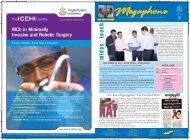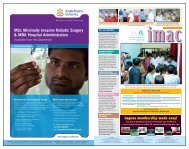Hindu Dharma and Organ Donation
Hindu Dharma and Organ Donation
Hindu Dharma and Organ Donation
Create successful ePaper yourself
Turn your PDF publications into a flip-book with our unique Google optimized e-Paper software.
“I always carry my donor card with me. It says that my<br />
whole body can be used for organ donation <strong>and</strong> medical<br />
purposes after my death. I would like to encourage as many<br />
people as possible to do the same”<br />
Dr Bal Mukund Bhala<br />
Co-ordinator <strong>Hindu</strong> International Medical Mission<br />
Former President <strong>Hindu</strong> Council UK<br />
<strong>Organ</strong> donation is a great gift<br />
but more donors are needed<br />
Everyone can make a difference<br />
Please<br />
• Talk to your family<br />
• Register your wishes<br />
• Carry a donor card<br />
To find out more about organ donation, or to join<br />
the NHS <strong>Organ</strong> Donor Register, contact:<br />
The <strong>Organ</strong> Donor Line<br />
0845 60 60 400<br />
www.uktransplant.org.uk<br />
<strong>Hindu</strong> <strong>Dharma</strong><br />
<strong>and</strong><br />
<strong>Organ</strong><br />
<strong>Donation</strong><br />
A guide to organ donation<br />
<strong>and</strong> <strong>Hindu</strong> beliefs<br />
Information on <strong>Hindu</strong>ism is available from:<br />
www.bbc.co.uk/religion<br />
Transplants save lives<br />
Compiled by Rachel Howitt, Bradford Hospitals NHS Trust<br />
Produced by UK Transplant, Fox Den Road, Stoke Gifford, Bristol BS34 8RR<br />
© UK Transplant April 2003<br />
This leaflet available<br />
in Hindi, Gujarati,<br />
Punjabi
<strong>Organ</strong> donation<br />
<strong>Organ</strong> donation is the gift of an organ to help someone else<br />
who needs a transplant. Hundreds of people’s lives are saved<br />
each year by organ transplants. <strong>Organ</strong>s that can be donated by<br />
people who have died include the heart, lungs, kidneys, liver,<br />
pancreas <strong>and</strong> small bowel. Tissue such as skin, bone, heart<br />
valves <strong>and</strong> corneas can also be used to help others.<br />
When can organ donation take place?<br />
Doctors <strong>and</strong> nurses are committed to doing everything possible<br />
to save life. <strong>Organ</strong>s are only removed for transplantation once<br />
all attempts to save life have failed <strong>and</strong> after death has been<br />
certified by a doctor or doctors who are entirely independent of<br />
the transplant team.<br />
Most donated organs come from people who die from a severe<br />
brain injury <strong>and</strong> who receive treatment on a ventilator in an<br />
intensive care unit. The brain injury damages vital centres in<br />
the brain stem which are essential to maintain life. No one can<br />
live once these centres have been destroyed. Tests can show<br />
conclusively when this has happened.<br />
In some circumstances, patients who die in hospital but are<br />
not on a ventilator may also donate. They are called<br />
non-heartbeating donors.<br />
Sometimes people who do not die in hospital can become<br />
tissue donors.<br />
Consent<br />
The consent, or lack of objection, of those closest to the patient<br />
is always sought before organs can be donated. This is why it<br />
is so important for people to discuss their wishes with their<br />
loved ones. <strong>Donation</strong> is an individual choice <strong>and</strong> views differ<br />
even within the same religious groups. Many families who<br />
agree to organ donation have said that it helps to know some<br />
good has come from their loss.<br />
Care <strong>and</strong> respect<br />
The removal of organs is carried out with the greatest care <strong>and</strong><br />
respect. The family can see the body afterwards <strong>and</strong> staff can<br />
contact a chaplain or local religious leader if the family wishes.<br />
<strong>Hindu</strong> <strong>Dharma</strong> <strong>and</strong> organ donation<br />
There are many references that support the concept of organ<br />
donation in <strong>Hindu</strong> scriptures. Daan is the original word in<br />
Sanskrit for donation meaning selfless giving. In the list of the<br />
ten Niyamas (virtuous acts) Daan comes third.<br />
“Of all the things that it is possible to donate, to donate your own body is<br />
infinitely more worthwhile.”<br />
The Manusmruti<br />
Life after death is a strong belief of <strong>Hindu</strong>s <strong>and</strong> is an ongoing<br />
process of rebirth. The law of Karma decides which way the<br />
soul will go in the next life. The Bhagavad Gita describes the<br />
mortal body <strong>and</strong> the immortal soul in a simple way like the<br />
relationship of clothes to a body:<br />
“vasamsi jirnani yatha vihaya<br />
navani grhnati naro ‘parani<br />
tatha sarirani vihaya jirnany<br />
anyani samyati nav<strong>and</strong>i dehi.”<br />
“As a person puts on new garments<br />
giving up the old ones<br />
the soul similarly accepts new material bodies<br />
giving up the old <strong>and</strong> useless ones.”<br />
Bhagavad Gita chapter 2:22<br />
Scientific <strong>and</strong> medical treatises (Charaka <strong>and</strong> Sushruta<br />
Samhita) form an important part of the Vedas. Sage Charaka<br />
deals with internal medicine while Sage Sushruta includes<br />
features of organ <strong>and</strong> limb transplants.<br />
“The important issue for a <strong>Hindu</strong> is that which sustains life should be<br />
accepted <strong>and</strong> promoted as <strong>Dharma</strong> (righteous living).<br />
<strong>Organ</strong> donation is an integral part of our living.”<br />
Hasmukh Velji Shah, International Trustee, World Council of <strong>Hindu</strong>s<br />
“<strong>Organ</strong> donation is in keeping with <strong>Hindu</strong> beliefs as it can help to<br />
save the lives of others.”<br />
Mr Om Parkash Sharma MBE, President, National Council of<br />
<strong>Hindu</strong> Temples









